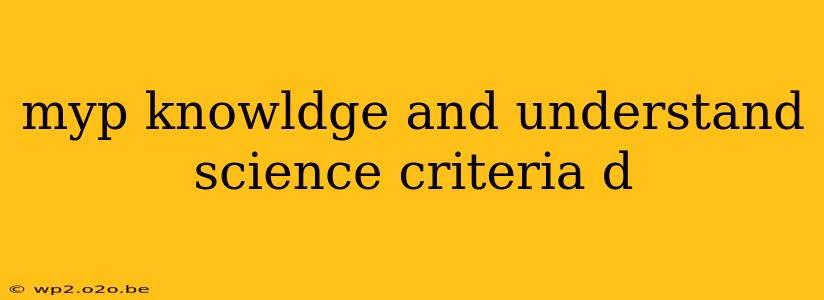Understanding the MYP Science Criteria: A Deep Dive for Students and Teachers
The Middle Years Programme (MYP) Science criteria are designed to assess students' understanding and application of scientific concepts, skills, and attitudes. This guide will break down each criterion, offering insights into what examiners look for and how students can best demonstrate their mastery. We'll explore the assessment process and provide strategies for success.
Understanding the MYP Science Assessment Model:
The MYP Science assessment is holistic, considering not only factual knowledge but also the application of scientific thinking, investigation skills, and communication. It utilizes a criterion-based approach, meaning each criterion is assessed independently, allowing for a nuanced understanding of a student's strengths and weaknesses. The criteria are:
Criterion A: Knowing and Understanding
This criterion assesses the extent to which students demonstrate knowledge and understanding of scientific concepts, theories, and processes. It focuses on:
- Recall of factual information: Students should demonstrate accurate recall of key scientific facts, definitions, and terminology.
- Application of knowledge: This goes beyond simple recall; students must apply their understanding to new situations and solve problems.
- Understanding of scientific concepts: Students should show a clear understanding of the underlying principles and relationships between different scientific concepts.
- Use of scientific language: Precise and appropriate scientific language should be consistently used throughout their work.
Criterion B: Investigating
This criterion assesses students' ability to plan and conduct investigations, analyze data, and draw conclusions. Key elements include:
- Formulating a scientific question: Students must be able to formulate a clear, testable scientific question.
- Designing an investigation: This involves selecting appropriate materials, methods, and variables, considering safety and ethical considerations.
- Collecting and processing data: Students must accurately collect and organize data, presenting it clearly in tables, graphs, or other appropriate formats.
- Analyzing data and drawing conclusions: Students should analyze their data objectively, identifying trends and patterns, and drawing valid conclusions based on their evidence. Understanding limitations of the investigation is also crucial.
Criterion C: Processing and Evaluating
This criterion focuses on the students' ability to process data, interpret information, and evaluate scientific claims and arguments. It involves:
- Analyzing data: Interpreting data to identify patterns, trends, and anomalies.
- Evaluating claims: Assessing the validity of scientific claims based on evidence and reasoning.
- Formulating conclusions: Drawing well-supported conclusions based on evidence and scientific understanding.
- Evaluating methodology: Critically analyzing the strengths and weaknesses of different investigative approaches.
- Applying scientific concepts: Using scientific concepts to explain observations and interpretations.
Criterion D: Communicating
This criterion assesses students' ability to communicate their scientific understanding clearly and effectively. This involves:
- Clarity and precision: Using clear and precise language to communicate scientific information.
- Structure and organization: Presenting information logically and systematically.
- Visual representation: Using appropriate visual aids (diagrams, graphs, tables) to enhance communication.
- Accuracy and completeness: Ensuring all information is accurate and complete.
- Use of scientific terminology: Appropriate use of scientific language to enhance the clarity of their communication.
Strategies for Success:
- Active learning: Engage actively in class, participate in discussions, and ask questions.
- Practice: Regularly practice applying concepts and skills through problem-solving and investigative activities.
- Seek feedback: Request feedback from teachers on your work to identify areas for improvement.
- Collaboration: Work collaboratively with peers to learn from each other and develop your skills.
- Organization: Keep organized notes and maintain a well-structured approach to your work.
By understanding these criteria and employing effective learning strategies, MYP Science students can significantly improve their performance and gain a deeper appreciation for scientific inquiry. This detailed breakdown provides a solid foundation for both students striving for excellence and teachers seeking to effectively guide their learners.

